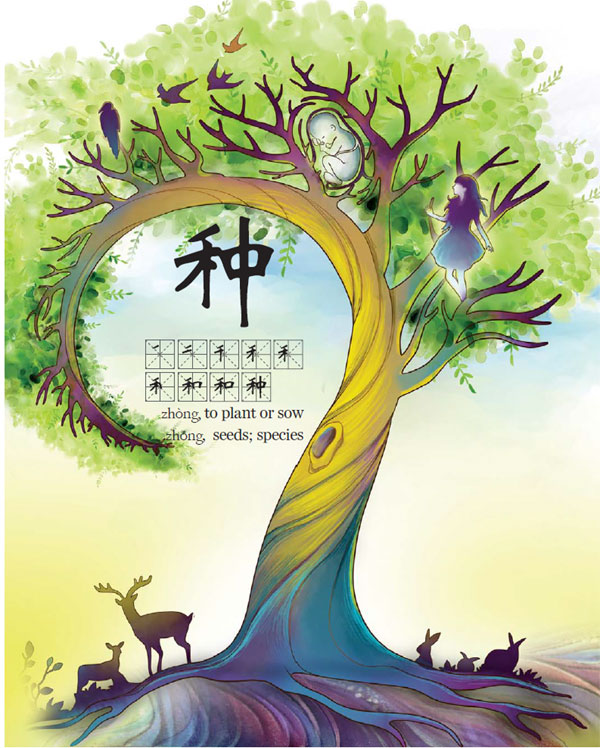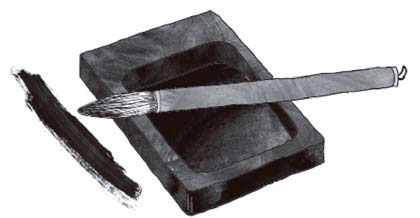It takes all sorts
Updated: 2016-07-22 07:37
By Huang Weijia and Liu Jue(China Daily Europe)
|
|||||||||
From a simple seed grows great and varied meaning
As autumn rain poured down on 900 poor villagers in 203 BC, they could only pray desperately for it to stop.
Escorted by two military officers, the villagers were to arrive at Yuyang (northeast of present-day Beijing) to serve as guards for the frontier forces of the Qin Dynasty (221-206 BC). Yet with the roads flooded, they lost all hope of making it on time.

The punishment for tardiness was death, a common sentence under the rule of the ferocious emperor, who had mobilized nearly 15 percent of the entire population to build the Great Wall, a luxury palace and a grand mausoleum.
Just as their bleak fortunes began to set in, Chen Sheng, a leader of the group, started to preach to his peers: “Kings, lords, generals and ministers, it’s not the noble breed that made them.” (王侯将相, 宁有种乎?)
Such a statement was shocking, but it worked. These poor peasants became rebels, and Chen became China’s version of Spartacus. Although ultimately defeated, Chen’s famous speech rang across the country, inspiring thousands of repressed people to join the rebellion, weakening the rule of the Qin, which crumbled three years later.
This historical tale leads us to our character of the day, 种, which has several pronunciations and meanings. Pronounced zhǒng as in the tale, it can mean breed, seed or species; but when pronounced zhòng, it means to plant or sow.
On the left side, 禾 (hé, standing grain, especially rice) represents its relationship to plants. The radical 中 (zhōng) was in its traditional form, 重 (zhòng), but has since been simplified. In both cases it represents the character’s pronunciation.
The original meaning of 种 is to sow, grow, plant and cultivate — 种花 (zhònghuā, plant flowers), 种菜 (zhòngcài, plant vegetables), 种田 (zhòngtián, cultivate the field).

The next time you plant something, here is some musing on karma for your garden: Plant melons, you get melons; sow beans, you get beans; as you sow, so will you reap (种瓜得瓜,种豆得豆; zhòng guā dé guā, zhòng dòu dé dòu).
Sometimes, the return can be long-term, as in the idiom: While earlier generations plant the trees, posterity will enjoy the shade (前人种树,后人乘凉; qián rén zhòngshù, hòu rén chéngliáng).
The character 种 can also be used in situations other than farming. For example, to have a dental implant is 种牙 (zhòngyá), while to have a vaccination is 接种疫苗 (jiēzhòng yìmiáo) or 种疫苗 (zhòng yìmiáo) for short.
As mentioned, when 种 is pronounced using the third tone, zhǒng, it turns into a noun. For example, you have 种子 (zhǒngzi; seeds) and 花种 (huāzhǒng; flower seeds). Seeds can also be figurative, such as a seeded player, 种子选手 (zhǒngzi xuǎnshǒu), or a seeded team, 种子队 (zhǒngzi duì).
Although originally connected with plants, the character can also refer to animals and people to mean species, or 物种 (wùzhǒng). When it comes to race, the word to use is 种族 (zhǒngzú), more academically known as 人种 (rénzhǒng). When a species dies out, which is sadly all too often these days, it is called 绝种 (juézhǒng).
Also, as you may imagine, the character is also involved in a few insults. Calling someone a 孬种 (nāozhǒng) is to say they have no guts, a coward. In a confrontation, you will probably hear the aggressive provocation: 有种的站出来 (Yǒu zhǒng de zhàn chūlái), which translates as “anyone who has guts step forward”.
种 can also typify subjects, meaning kind, style, sort and type, as in 种类 (zhǒnglèi). For any special type, use 特种 (tèzhǒng), such as 特种部队 (tèzhǒng bùduì; special force). The character is also a measure word. For instance, 汉语是一种美丽的语言 (Hànyǔ shì yīzhǒng měilì de yǔyán) means Chinese is a type of beautiful language.
From plants, animals, people, and more, 种 is a testament to the colorful world in which we live.
Courtesy of The World of Chinese, www.theworldofchinese.com
The World of Chinese
(China Daily European Weekly 07/22/2016 page23)
Today's Top News
French president urges Britain to begin EU exit talks
Turkey to restructure its army after coup attempt
UK to keep close economic ties with Germany: May
China's Fosun buys UK's Wolves for 45 million pounds
Rio 2016: Russia loses doping appeal
Brussels police: Bomb aleart was false alarm
May takes center stage in parliament's box-office show
Turkey's failed coup to consolidate Erdogan's power
Hot Topics
Lunar probe , China growth forecasts, Emission rules get tougher, China seen through 'colored lens', International board,
Editor's Picks

|

|

|

|

|

|







